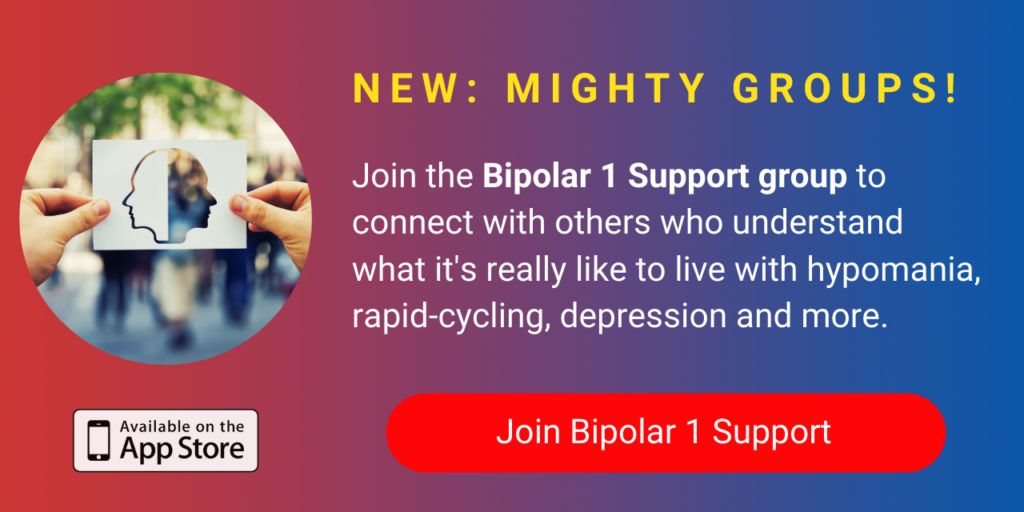I’m often told to not define myself by my bipolar disorder, and to not see it as a part of my identity. “You are not your illness,” people say.
• What is Bipolar disorder?
When they say this, I understand that they think bipolar is purely a negative thing — something I should be trying hard to get rid of completely. Well, my bipolar is not going away, it’s not totally negative and bipolar is a loud and proud part of my identity.
When I was first diagnosed, I felt bereft. I had it planned that one day, the mental health issues I was having would be cured and I would become a “normal” person. Receiving a diagnosis of a lifelong condition was overwhelming and hard to accept. I cried a lot, and really saw myself as a victim of my own genetics. After this initial grieving period, my new “normal fantasy” was that, when I became stable, this would be as good as not having bipolar at all.
So, discovering that being stable does not mean that my bipolar disappears felt like a huge loss to me. But once I learned to accept who I was, and that the bipolar disorder is truly is here to stay, I learned that certain things in my environment were not suitable for a bipolar life. And that, in order to feel comfortable and love myself, those things had to go.
Two big things made me feel like I am a lesser person:
1. Stigma.
2. Failing to treat myself as a “bipolar person,” and go a little easier on myself sometimes.
Part of the problem with being a “bipolar person” is that the world is not a very bipolar-friendly place. No matter how many times people tell you that you should feel comfortable being yourself, if you are neurodivergent, you’ll know that you can’t really just act however you like and say whatever you want. It can be exhausting to try and act like a non-bipolar person. It can be incredibly bad for your self-esteem when you fail at being a socially acceptable person yet again.
Reducing the amount of exposure I have to situations that socially exhaust me was a massive help. An easy way of doing this was to “come out.” Now, this wasn’t easy, and it meant a lot of my friends and family members no longer speak to me. And if they do speak to me, they avoid having conversations to me of any emotional depth. Because of stigma and their own ignorance, they are scared I’ll explode. But this is not a negative; I don’t want people in my life who are only there because they don’t know I have bipolar. And even if I didn’t have bipolar, I’d have no interest in relationships with bigoted people.
It turns out that you get invited to way fewer parties for which you need to socially mask if you are an “out” bipolar person, so this is a quick win.
The people who have accepted me are safe people. I know I can tell them if I need to make an adjustment to something we’re doing because of my bipolar. I know they’ll be OK with me being very quiet, or extra talkative. My closest friends and family all know, which helps me with my routine and social situations (which I always find difficult, even if it’s with safe people).
Ask yourself, how is the stigma in your environment affecting your self-esteem?
Then, the second thought that was making me hate my bipolar self: “why can’t I do X like normal people? I’m a failure!”
Why can’t I hold down a job? Why can’t I go traveling the world? Why do so many people hate me? Why can’t I get married and have kids?
First things first: I cannot do the 9 to 5. It is physically impossible for me, but I am a great freelancer. If I didn’t have bipolar, would I be so successful as a self-employed person? Or would I be living a miserable corporate life?
Secondly, I would love to travel, but in practice it’s difficult. This has taught me to enjoy where I am and whatever is going on now. I’m sure non-bipolar me would have traveled the world, but as things are, a sunny day and a nice cup of tea bring me a great deal of pleasure.
I can’t be friends with certain people that I would otherwise be very attracted to because while they may be very interesting and exciting, they are too high conflict to be around and cause me a lot of stress. It’s not that everyone hates me; it’s that I need to befriend people who are a little bit more understanding and sensible.
And the marriage and kids part … well, I do that just fine. It turns out, in some ways, I was stigmatizing myself.
I regret none of the ways I have adapted my life for my bipolar. I think they’ve only been improvements that I have bipolar to thank for.
Being in a space that is safe and positive toward me allows me to be my full self. It’s OK if my energy levels fluctuate, or if I have an outlandish idea. If I become obsessed with a certain topic, the people in my life just laugh with me in an affectionate way, instead of laughing at me behind my back. Because they love me.
I love myself too; I want to be happy and safe. I want to live for a long time.
And the thing I love the most about myself and my bipolar is this:
People come to me. They come to me when their parent has died and no one else wants to look their grief in the eye. They come to me to talk about their own mental health issues. Or abuse. Or the crimes they’ve committed. They know I’ve experienced pain, and I’ve made a fool of myself and I’ve been wrong and vulnerable. They know I’m not going to say “well, are you sure they really meant it that way?” Or, “put things into perspective; there are people out there who have nothing to eat!” I don’t give filthy looks to strangers who are experiencing psychosis; I say hello.
I love that my bipolar means I may not go down so well at funerals and christenings, but when it comes to true, deep human connection, I’m able to do that with so many.
Photo by Esther Driehaus on Unsplash


